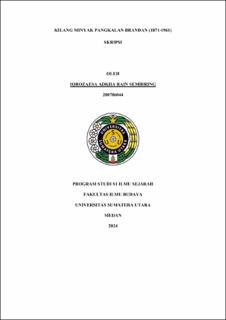| dc.description.abstract | This research discusses the Pangkalan Brandan Oil Refinery during the
period of 1871–1961. The refinery is inseparable from its significant role during the
colonial era and the Japanese occupation, where it had a major influence on
production and infrastructure in both periods. After Indonesia's independence, the
refinery became a focal point in the struggle for independence, as it was targeted
for takeover. Following the successful takeover, the refinery faced numerous
challenges, including destruction during the "scorched earth" policy, unclear
ownership status, internal corporate conflicts, separatist threats, and stagnation.
However, the condition of the refinery triggered changes in Indonesia's mining
laws, and the Pangkalan Brandan Oil Refinery became a catalyst for returning
mining assets to the state. The aim of this research is to explain the condition of the
Pangkalan Brandan Oil Refinery before independence, the struggle for the
clarification of its ownership status after the Dutch-Indonesian Round Table
Conference (KMB), as well as the obstacles and efforts to restore the refinery after
the scorched earth event. This research employs historical methods. The initial stage
involves gathering supporting data from various libraries and institutions, such as
the National Archives of the Republic of Indonesia in Jakarta and the National
Library of Indonesia. After data collection, the next step is to filter and analyze the
data, which is then written into a historical thesis. The results of this research show
that the Pangkalan Brandan Oil Refinery had a cross-era and cross-authority
influence: as a pioneer in the development of the oil industry during the colonial
era, a source of oil for Japan's wartime needs, and a symbol of resistance during
Indonesia's revolutionary period. The refinery also became the main reason for the
revision of the Mining Law and marked the beginning of the oil and gas industry
history in Indonesia. | en_US |


